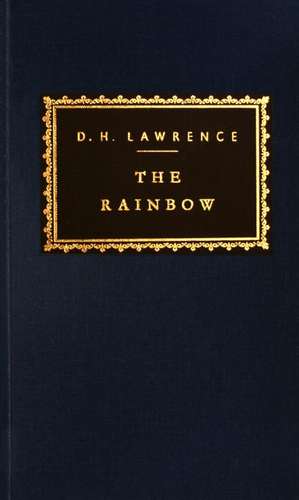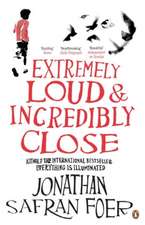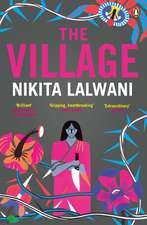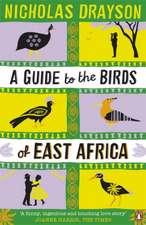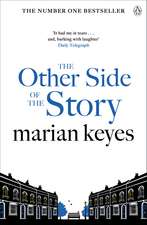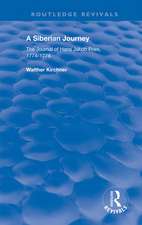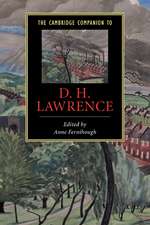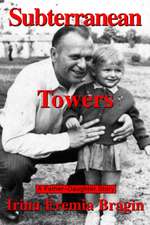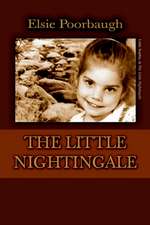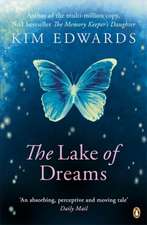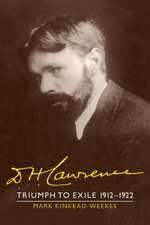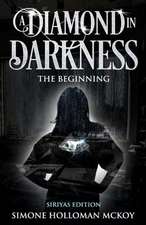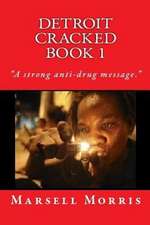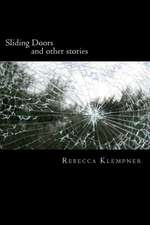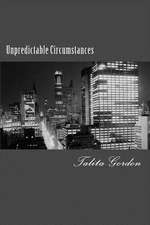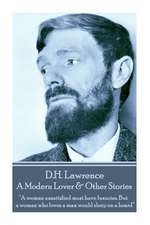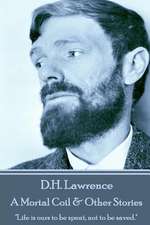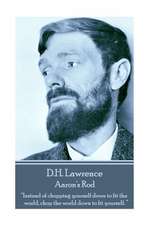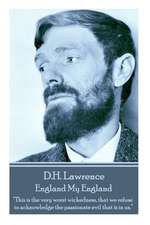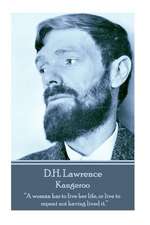The Rainbow
Autor D. H. Lawrenceen Limba Engleză Hardback – 26 oct 1993
In its surface drama, in its capacious and expansive rhythms that so resemble the rhythms of nature itself, THE RAINBOW is one of the world’s great examples of the multi-generational family saga. But the large claim that Lawrence’s masterpiece has made on the attention of readers and critics stems less from this fact than from the deeper parallel history he provides for the Brangwens—a history of the growth of their souls, moving in a great arc from sensuality to self-awareness and freedom.
| Toate formatele și edițiile | Preț | Express |
|---|---|---|
| Paperback (27) | 51.19 lei 10-16 zile | +22.77 lei 7-13 zile |
| Oxford University Press – 10 iul 2008 | 51.19 lei 10-16 zile | +22.77 lei 7-13 zile |
| Penguin Books – 28 mar 2007 | 51.19 lei 26-32 zile | +28.88 lei 7-13 zile |
| Random House UK – 2 feb 2011 | 55.38 lei 26-32 zile | +22.80 lei 7-13 zile |
| CreateSpace Independent Publishing Platform – | 69.53 lei 3-5 săpt. | |
| CREATESPACE – | 86.55 lei 3-5 săpt. | |
| CREATESPACE – | 95.99 lei 3-5 săpt. | |
| CREATESPACE – | 103.34 lei 3-5 săpt. | |
| EMPIRE BOOKS – 30 noi 2011 | 107.93 lei 3-5 săpt. | |
| CREATESPACE – | 119.03 lei 3-5 săpt. | |
| CREATESPACE – | 122.09 lei 3-5 săpt. | |
| CREATESPACE – | 122.62 lei 3-5 săpt. | |
| CreateSpace Independent Publishing Platform – | 123.81 lei 3-5 săpt. | |
| CREATESPACE – | 128.27 lei 3-5 săpt. | |
| Classics Press – 28 feb 2011 | 138.78 lei 3-5 săpt. | |
| CREATESPACE – | 166.90 lei 3-5 săpt. | |
| CREATESPACE – | 177.77 lei 3-5 săpt. | |
| CREATESPACE – | 178.38 lei 3-5 săpt. | |
| Cambridge University Press – 18 dec 2002 | 241.99 lei 3-5 săpt. | +35.90 lei 7-13 zile |
| KUPERARD (BRAVO LTD) – 21 mar 2002 | 111.16 lei 6-8 săpt. | |
| CREATESPACE – | 114.64 lei 6-8 săpt. | |
| – | 119.62 lei 6-8 săpt. | |
| Digireads.com – 27 mai 2020 | 121.08 lei 6-8 săpt. | |
| Serenity Publishers, LLC – 3 sep 2012 | 142.39 lei 6-8 săpt. | |
| Read & Co. Classics – 6 noi 2020 | 160.61 lei 6-8 săpt. | |
| Mint Editions – mai 2021 | 172.44 lei 38-44 zile | |
| Echo Library – 31 ian 2012 | 175.29 lei 38-44 zile | |
| Egoist Press – 28 aug 2018 | 188.98 lei 6-8 săpt. | |
| Hardback (3) | 84.29 lei 26-32 zile | +36.22 lei 7-13 zile |
| EVERYMAN – 15 sep 1993 | 84.29 lei 26-32 zile | +36.22 lei 7-13 zile |
| Mint Editions – 7 mai 2021 | 170.99 lei 3-5 săpt. | |
| Cambridge University Press – 8 mar 1989 | 853.49 lei 6-8 săpt. |
Preț: 150.15 lei
Nou
Puncte Express: 225
Preț estimativ în valută:
28.74€ • 29.89$ • 24.05£
28.74€ • 29.89$ • 24.05£
Carte indisponibilă temporar
Doresc să fiu notificat când acest titlu va fi disponibil:
Se trimite...
Preluare comenzi: 021 569.72.76
Specificații
ISBN-13: 9780679423058
ISBN-10: 0679423052
Pagini: 496
Dimensiuni: 134 x 211 x 31 mm
Greutate: 0.59 kg
Editura: Knopf Doubleday Publishing Group
ISBN-10: 0679423052
Pagini: 496
Dimensiuni: 134 x 211 x 31 mm
Greutate: 0.59 kg
Editura: Knopf Doubleday Publishing Group
Extras
Chapter 1
How Tom Brangwen Married a Polish Lady
The Brangwens had lived for generations on the Marsh Farm, in the meadows where the Erewash twisted sluggishly through alder trees, separating Derbyshire from Nottinghamshire. Two miles away, a church-tower stood on a hill, the houses of the little country town climbing assiduously up to it. Whenever one of the Brangwens in the fields lifted his head from his work, he saw the church-tower at Ilkeston in the empty sky. So that as he turned again to the horizontal land, he was aware of something standing above him and beyond him in the distance.
There was a look in the eyes of the Brangwens as if they were expecting something unknown, about which they were eager. They had that air of readiness for what would come to them, a kind of surety, an expectancy, the look of an inheritor.
They were fresh, blond, slow-speaking people, revealing themselves plainly, but slowly, so that one could watch the change in their eyes from laughter to anger, blue, lit-up laughter, to a hard blue- staring anger; through all the irresolute stages of the sky when the weather is changing.
Living on rich land, on their own land, near to a growing town, they had forgotten what it was to be in straitened circumstances. They had never become rich, because there were always children, and the patrimony was divided every time. But always, at the Marsh, there was ample.
So the Brangwens came and went without fear of necessity, working hard because of the life that was in them, not for want of the money. Neither were they thriftless. They were aware of the last halfpenny, and instinct made them not waste the peeling of their apple, for it would help to feed the cattle. But heaven and earth was teeming around them, and how should this cease? They felt the rush of the sap in spring, they knew the wave which cannot halt, but every year throws forward the seed to begetting, and, falling back, leaves the young-born on the earth. They knew the intercourse between heaven and earth, sunshine drawn into the breast and bowels, the rain sucked up in the daytime, nakedness that comes under the wind in autumn, showing the birds’ nests no longer worth hiding. Their life and interrelations were such; feeling the pulse and body of the soil, that opened to their furrow for the grain, and became smooth and supple after their ploughing, and clung to their feet with a weight that pulled like desire, lying hard and unresponsive when the crops were to be shorn away. The young corn waved and was silken, and the lustre slid along the limbs of the men who saw it. They took the udder of the cows, the cows yielded milk and pulse against the hands of the men, the pulse of the blood of the teats of the cows beat into the pulse of the hands of the men. They mounted their horses, and held life between the grip of their knees, they harnessed their horses at the wagon, and, with hand on the bridle-rings, drew the heaving of the horses after their will.
In autumn the partridges whirred up, birds in flocks blew like spray across the fallow, rooks appeared on the grey, watery heavens, and flew cawing into the winter. Then the men sat by the fire in the house where the women moved about with surety, and the limbs and the body of the men were impregnated with the day, cattle and earth and vegetation and the sky, the men sat by the fire and their brains were inert, as their blood flowed heavy with the accumulation from the living day.
The women were different. On them too was the drowse of blood-intimacy, calves sucking and hens running together in droves, and young geese palpitating in the hand while the food was pushed down their throttle. But the women looked out from the heated, blind intercourse of farm-life, to the spoken world beyond. They were aware of the lips and the mind of the world speaking and giving utterance, they heard the sound in the distance, and they strained to listen.
It was enough for the men, that the earth heaved and opened its furrow to them, that the wind blew to dry the wet wheat, and set the young ears of corn wheeling freshly round about; it was enough that they helped the cow in labour, or ferreted the rats from under the barn, or broke the back of a rabbit with a sharp knock of the hand. So much warmth and generating and pain and death did they know in their blood, earth and sky and beast and green plants, so much exchange and interchange they had with these, that they lived full and surcharged, their senses full fed, their faces always turned to the heat of the blood, staring into the sun, dazed with looking towards the source of generation, unable to turn round.
But the woman wanted another form of life than this, something that was not blood-intimacy. Her house faced out from the farm- buildings and fields, looked out to the road and the village with church and Hall and the world beyond. She stood to see the far-off world of cities and governments and the active scope of man, the magic land to her, where secrets were made known and desires fulfilled. She faced outwards to where men moved dominant and creative, having turned their back on the pulsing heat of creation, and with this behind them, were set out to discover what was beyond, to enlarge their own scope and range and freedom; whereas the Brangwen men faced inwards to the teeming life of creation, which poured unresolved into their veins.
Looking out, as she must, from the front of her house towards the activity of man in the world at large, whilst her husband looked out to the back at sky and harvest and beast and land, she strained her eyes to see what man had done in fighting outwards to knowledge, she strained to hear how he uttered himself in his conquest, her deepest desire hung on the battle that she heard, far off, being waged on the edge of the unknown. She also wanted to know, and to be of the fighting host.
At home, even so near as Cossethay, was the vicar, who spoke the other, magic language, and had the other, finer bearing, both of which she could perceive, but could never attain to. The vicar moved in worlds beyond where her own menfolk existed. Did she not know her own menfolk: fresh, slow, full-built men, masterful enough, but easy, native to the earth, lacking outwardness and range of motion. Whereas the vicar, dark and dry and small beside her husband, had yet a quickness and a range of being that made Brangwen, in his large geniality, seem dull and local. She knew her husband. But in the vicar’s nature was that which passed beyond her knowledge. As Brangwen had power over the cattle so the vicar had power over her husband. What was it in the vicar, that raised him above the common men as man is raised above the beast? She craved to know. She craved to achieve this higher being, if not in herself, then in her children. That which makes a man strong even if he be little and frail in body, just as any man is little and frail beside a bull, and yet stronger than the bull, what was it? It was not money nor power nor position. What power had the vicar over Tom Brangwen—none. Yet strip them and set them on a desert island, and the vicar was the master. His soul was master of the other man’s. And why—why? She decided it was a question of knowledge.
The curate was poor enough, and not very efficacious as a man, either, yet he took rank with those others, the superior. She watched his children being born, she saw them running as tiny things beside their mother. And already they were separate from her own children, distinct. Why were her own children marked below those others? Why should the curate’s children inevitably take precedence over her children, why should dominance be given them from the start? It was not money, nor even class. It was education and experience, she decided.
It was this, this education, this higher form of being, that the mother wished to give to her children, so that they too could live the supreme life on earth. For her children, at least the children of her heart, had the complete nature that should take place in equality with the living, vital people in the land, not be left behind obscure among the labourers. Why must they remain obscured and stifled all their lives, why should they suffer from lack of freedom to move? How should they learn the entry into the finer, more vivid circle of life?
Her imagination was fired by the squire’s lady at Shelly Hall, who came to church at Cossethay with her little children, girls in tidy capes of beaver fur, and smart little hats, herself like a winter rose, so fair and delicate. So fair, so fine in mould, so luminous, what was it that Mrs. Hardy felt which she, Mrs. Brangwen did not feel? How was Mrs. Hardy’s nature different from that of the common women of Cossethay, in what was it beyond them? All the women of Cossethay talked eagerly about Mrs. Hardy, of her husband, her children, her guests, her dress, of her servants and her housekeeping. The lady of the Hall was the living dream of their lives, her life was the epic that inspired their lives. In her they lived imaginatively, and in gossiping of her husband who drank, of her scandalous brother, of Lord William Bentley her friend, member of Parliament for the division, they had their own Odyssey enacting itself, Penelope and Ulysses before them, and Circe and the swine and the endless web.
So the women of the village were fortunate. They saw themselves in the lady of the manor, each of them lived her own fulfillment in the life of Mrs. Hardy. And the Brangwen wife of the Marsh aspired beyond herself, towards the further life of the finer woman, towards the extended being she revealed, as a traveller in his self-contained manner reveals far-off countries present in himself. But why should a knowledge of far-off countries make a man’s life a different thing, finer, bigger? And why is a man more than the beast and the cattle that serve him? It is the same thing.
The male part of the poem was filled in by such men as the vicar and Lord William, lean, eager men with strange movements, men who had command of the further fields, whose lives ranged over a great extent. Ah, it was something very desirable to know, this touch of the wonderful men who had the power of thought and comprehension. The women of the village might be much fonder of Tom Brangwen, and more at their ease with him, yet if their lives had been robbed of the vicar, and of Lord William, the leading shoot would have been cut away from them, they would have been heavy and uninspired and inclined to hate. So long as the wonder of the beyond was before them, they could get along, whatever their lot. And Mrs. Hardy, and the vicar, and Lord William, these moved in the wonder of the beyond, and were visible to the eyes of Cossethay in their motion.
From the Trade Paperback edition.
How Tom Brangwen Married a Polish Lady
The Brangwens had lived for generations on the Marsh Farm, in the meadows where the Erewash twisted sluggishly through alder trees, separating Derbyshire from Nottinghamshire. Two miles away, a church-tower stood on a hill, the houses of the little country town climbing assiduously up to it. Whenever one of the Brangwens in the fields lifted his head from his work, he saw the church-tower at Ilkeston in the empty sky. So that as he turned again to the horizontal land, he was aware of something standing above him and beyond him in the distance.
There was a look in the eyes of the Brangwens as if they were expecting something unknown, about which they were eager. They had that air of readiness for what would come to them, a kind of surety, an expectancy, the look of an inheritor.
They were fresh, blond, slow-speaking people, revealing themselves plainly, but slowly, so that one could watch the change in their eyes from laughter to anger, blue, lit-up laughter, to a hard blue- staring anger; through all the irresolute stages of the sky when the weather is changing.
Living on rich land, on their own land, near to a growing town, they had forgotten what it was to be in straitened circumstances. They had never become rich, because there were always children, and the patrimony was divided every time. But always, at the Marsh, there was ample.
So the Brangwens came and went without fear of necessity, working hard because of the life that was in them, not for want of the money. Neither were they thriftless. They were aware of the last halfpenny, and instinct made them not waste the peeling of their apple, for it would help to feed the cattle. But heaven and earth was teeming around them, and how should this cease? They felt the rush of the sap in spring, they knew the wave which cannot halt, but every year throws forward the seed to begetting, and, falling back, leaves the young-born on the earth. They knew the intercourse between heaven and earth, sunshine drawn into the breast and bowels, the rain sucked up in the daytime, nakedness that comes under the wind in autumn, showing the birds’ nests no longer worth hiding. Their life and interrelations were such; feeling the pulse and body of the soil, that opened to their furrow for the grain, and became smooth and supple after their ploughing, and clung to their feet with a weight that pulled like desire, lying hard and unresponsive when the crops were to be shorn away. The young corn waved and was silken, and the lustre slid along the limbs of the men who saw it. They took the udder of the cows, the cows yielded milk and pulse against the hands of the men, the pulse of the blood of the teats of the cows beat into the pulse of the hands of the men. They mounted their horses, and held life between the grip of their knees, they harnessed their horses at the wagon, and, with hand on the bridle-rings, drew the heaving of the horses after their will.
In autumn the partridges whirred up, birds in flocks blew like spray across the fallow, rooks appeared on the grey, watery heavens, and flew cawing into the winter. Then the men sat by the fire in the house where the women moved about with surety, and the limbs and the body of the men were impregnated with the day, cattle and earth and vegetation and the sky, the men sat by the fire and their brains were inert, as their blood flowed heavy with the accumulation from the living day.
The women were different. On them too was the drowse of blood-intimacy, calves sucking and hens running together in droves, and young geese palpitating in the hand while the food was pushed down their throttle. But the women looked out from the heated, blind intercourse of farm-life, to the spoken world beyond. They were aware of the lips and the mind of the world speaking and giving utterance, they heard the sound in the distance, and they strained to listen.
It was enough for the men, that the earth heaved and opened its furrow to them, that the wind blew to dry the wet wheat, and set the young ears of corn wheeling freshly round about; it was enough that they helped the cow in labour, or ferreted the rats from under the barn, or broke the back of a rabbit with a sharp knock of the hand. So much warmth and generating and pain and death did they know in their blood, earth and sky and beast and green plants, so much exchange and interchange they had with these, that they lived full and surcharged, their senses full fed, their faces always turned to the heat of the blood, staring into the sun, dazed with looking towards the source of generation, unable to turn round.
But the woman wanted another form of life than this, something that was not blood-intimacy. Her house faced out from the farm- buildings and fields, looked out to the road and the village with church and Hall and the world beyond. She stood to see the far-off world of cities and governments and the active scope of man, the magic land to her, where secrets were made known and desires fulfilled. She faced outwards to where men moved dominant and creative, having turned their back on the pulsing heat of creation, and with this behind them, were set out to discover what was beyond, to enlarge their own scope and range and freedom; whereas the Brangwen men faced inwards to the teeming life of creation, which poured unresolved into their veins.
Looking out, as she must, from the front of her house towards the activity of man in the world at large, whilst her husband looked out to the back at sky and harvest and beast and land, she strained her eyes to see what man had done in fighting outwards to knowledge, she strained to hear how he uttered himself in his conquest, her deepest desire hung on the battle that she heard, far off, being waged on the edge of the unknown. She also wanted to know, and to be of the fighting host.
At home, even so near as Cossethay, was the vicar, who spoke the other, magic language, and had the other, finer bearing, both of which she could perceive, but could never attain to. The vicar moved in worlds beyond where her own menfolk existed. Did she not know her own menfolk: fresh, slow, full-built men, masterful enough, but easy, native to the earth, lacking outwardness and range of motion. Whereas the vicar, dark and dry and small beside her husband, had yet a quickness and a range of being that made Brangwen, in his large geniality, seem dull and local. She knew her husband. But in the vicar’s nature was that which passed beyond her knowledge. As Brangwen had power over the cattle so the vicar had power over her husband. What was it in the vicar, that raised him above the common men as man is raised above the beast? She craved to know. She craved to achieve this higher being, if not in herself, then in her children. That which makes a man strong even if he be little and frail in body, just as any man is little and frail beside a bull, and yet stronger than the bull, what was it? It was not money nor power nor position. What power had the vicar over Tom Brangwen—none. Yet strip them and set them on a desert island, and the vicar was the master. His soul was master of the other man’s. And why—why? She decided it was a question of knowledge.
The curate was poor enough, and not very efficacious as a man, either, yet he took rank with those others, the superior. She watched his children being born, she saw them running as tiny things beside their mother. And already they were separate from her own children, distinct. Why were her own children marked below those others? Why should the curate’s children inevitably take precedence over her children, why should dominance be given them from the start? It was not money, nor even class. It was education and experience, she decided.
It was this, this education, this higher form of being, that the mother wished to give to her children, so that they too could live the supreme life on earth. For her children, at least the children of her heart, had the complete nature that should take place in equality with the living, vital people in the land, not be left behind obscure among the labourers. Why must they remain obscured and stifled all their lives, why should they suffer from lack of freedom to move? How should they learn the entry into the finer, more vivid circle of life?
Her imagination was fired by the squire’s lady at Shelly Hall, who came to church at Cossethay with her little children, girls in tidy capes of beaver fur, and smart little hats, herself like a winter rose, so fair and delicate. So fair, so fine in mould, so luminous, what was it that Mrs. Hardy felt which she, Mrs. Brangwen did not feel? How was Mrs. Hardy’s nature different from that of the common women of Cossethay, in what was it beyond them? All the women of Cossethay talked eagerly about Mrs. Hardy, of her husband, her children, her guests, her dress, of her servants and her housekeeping. The lady of the Hall was the living dream of their lives, her life was the epic that inspired their lives. In her they lived imaginatively, and in gossiping of her husband who drank, of her scandalous brother, of Lord William Bentley her friend, member of Parliament for the division, they had their own Odyssey enacting itself, Penelope and Ulysses before them, and Circe and the swine and the endless web.
So the women of the village were fortunate. They saw themselves in the lady of the manor, each of them lived her own fulfillment in the life of Mrs. Hardy. And the Brangwen wife of the Marsh aspired beyond herself, towards the further life of the finer woman, towards the extended being she revealed, as a traveller in his self-contained manner reveals far-off countries present in himself. But why should a knowledge of far-off countries make a man’s life a different thing, finer, bigger? And why is a man more than the beast and the cattle that serve him? It is the same thing.
The male part of the poem was filled in by such men as the vicar and Lord William, lean, eager men with strange movements, men who had command of the further fields, whose lives ranged over a great extent. Ah, it was something very desirable to know, this touch of the wonderful men who had the power of thought and comprehension. The women of the village might be much fonder of Tom Brangwen, and more at their ease with him, yet if their lives had been robbed of the vicar, and of Lord William, the leading shoot would have been cut away from them, they would have been heavy and uninspired and inclined to hate. So long as the wonder of the beyond was before them, they could get along, whatever their lot. And Mrs. Hardy, and the vicar, and Lord William, these moved in the wonder of the beyond, and were visible to the eyes of Cossethay in their motion.
From the Trade Paperback edition.
Recenzii
“[Lawrence] had that quality of genius which sucks out of ordinary experience essences strange or unknown to men.” —Anaïs Nin
From the Trade Paperback edition.
From the Trade Paperback edition.
Notă biografică
The son of a miner, the prolific novelist, poet, and travel writer David Herbert Lawrence was born in Eastwood, Nottinghamshire, in 1885. He attended Nottingham University and found employment as a schoolteacher. His first novel, The White Peacock, was published in 1911, the same year his beloved mother died and he quit teaching after contracting pneumonia. The next year Lawrence published Sons and Lovers and ran off to Germany with Frieda Weekley, his former tutor’s wife. His masterpieces The Rainbow and Women in Love were completed in quick succession, but the first was suppressed as indecent and the second was not published until 1920. Lawrence’s lyrical writings challenged convention, promoting a return to an ideal of nature where sex is seen as a sacrament. In 1928 Lawrence’s final novel, Lady Chatterley’s Lover, was banned in England and the United States for indecency. He died of tuberculosis in 1930 in Venice.
Descriere
Descriere de la o altă ediție sau format:
To be oneself was a supreme, gleaming triumph of infinity This is the insight that flashes upon Ursula as she struggles to assert her individuality and to stand separate from her family and her surroundings on the brink of womanhood and the modern world. In The Rainbow (1915) Lawrence challenged the customary limitations of language and convention to carry into the structure of his prose the fascination with boundaries and space that characterize the entire novel. Condemned and suppressed on its first publication for its open treatment of sexuality and its `unpatriotic' spirit, the novel chronicles the lives of three generations of the Brangwen family over a period of more than 60 years, setting them against the emergence of modern England. The central figure of ursula becomes the focus of Lawrence's examination of relationships and the conflicts they bring, and the inextricable mingling of the physical and the spiritual. Suffused with biblical imagery, The Rainbow addresses searching human issues in a setting of precise and vivid detail. In her introduction to this edition Kate Flint illuminates Lawrence's aims and achievements against the background of the burgeoning century. ABOUT THE SERIES: For over 100 years Oxford World's Classics has made available the widest range of literature from around the globe. Each affordable volume reflects Oxford's commitment to scholarship, providing the most accurate text plus a wealth of other valuable features, including expert introductions by leading authorities, helpful notes to clarify the text, up-to-date bibliographies for further study, and much more.
To be oneself was a supreme, gleaming triumph of infinity This is the insight that flashes upon Ursula as she struggles to assert her individuality and to stand separate from her family and her surroundings on the brink of womanhood and the modern world. In The Rainbow (1915) Lawrence challenged the customary limitations of language and convention to carry into the structure of his prose the fascination with boundaries and space that characterize the entire novel. Condemned and suppressed on its first publication for its open treatment of sexuality and its `unpatriotic' spirit, the novel chronicles the lives of three generations of the Brangwen family over a period of more than 60 years, setting them against the emergence of modern England. The central figure of ursula becomes the focus of Lawrence's examination of relationships and the conflicts they bring, and the inextricable mingling of the physical and the spiritual. Suffused with biblical imagery, The Rainbow addresses searching human issues in a setting of precise and vivid detail. In her introduction to this edition Kate Flint illuminates Lawrence's aims and achievements against the background of the burgeoning century. ABOUT THE SERIES: For over 100 years Oxford World's Classics has made available the widest range of literature from around the globe. Each affordable volume reflects Oxford's commitment to scholarship, providing the most accurate text plus a wealth of other valuable features, including expert introductions by leading authorities, helpful notes to clarify the text, up-to-date bibliographies for further study, and much more.
Cuprins
General editor's preface; Acknowledgements; Chronology; Cue titles; Introduction; The Rainbow; Appendix 1. Fragment of 'The Sisters'; Appendix 2. Fragment of 'The Sisters II'; Appendix 3. Report and letter on 'The Wedding Ring'; Appendix 4. Chronology of The Rainbow; Explanatory notes; Textual apparatus; A note on pounds, shillings and pence.
